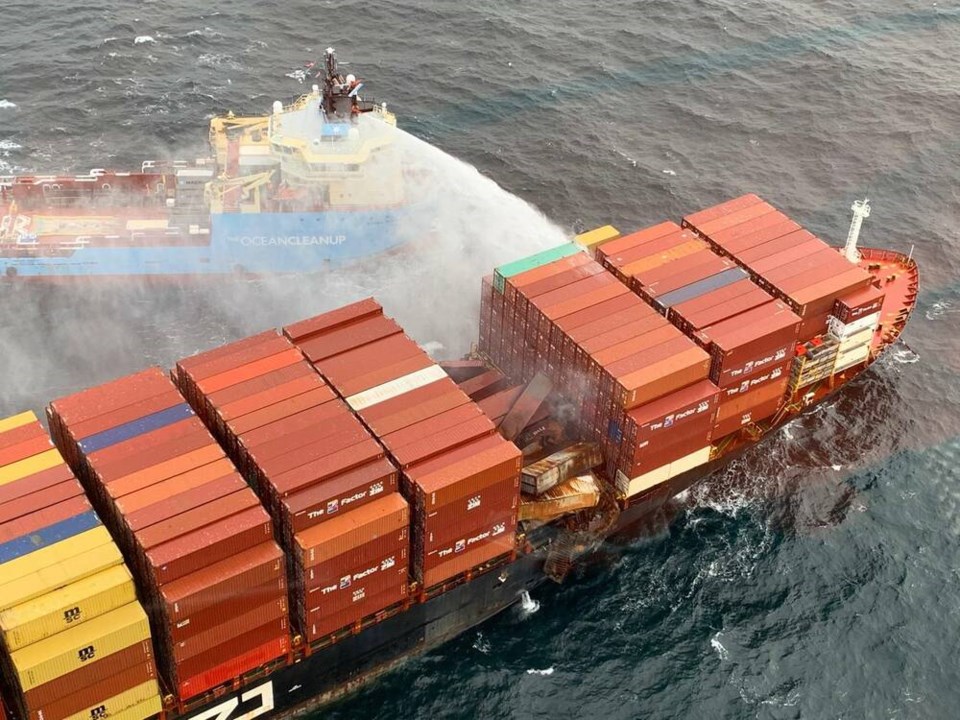A commentary by an adjunct professor of environmental studies at the University of Victoria.
On the night of Oct. 20 and 21, the Maltese-flagged Zim Kingston did what international shipping vessels do all the time in Canadian waters: It dumped huge numbers of shipping containers into the sea.
The only reason it caught our attention is that the vessel also caught fire, for reasons that remain somewhat mysterious, and burned hazardous materials for weeks, and did so right off our coast.
Lost in this story is that international shipping vessels dump shipping containers into the ocean on a regular basis, and barely anyone seems to care. The only time it makes the news is when it happens in the immediate vicinity of the coastline.
But surely it is occurring even more frequently farther afloat, yet within Canada’s 200-mile exclusive economic zone, adding microplastics and toxins to our marine ecosystem. The complete lack of transparency in this industry means the public never learns the truth.
The disaster of the Zim Kingston is a wake-up call and stark reminder that the federal government — Transport Canada and Fisheries and Oceans Canada — need to take immediate action to better regulate international shipping. Three ideas immediately come to mind.
First, stricter limits need to be placed on the stacked height of shipping containers, and especially ones carrying hazardous materials. News flash: the Pacific Ocean has a lot of stormy weather, and if a few waves cause vessels to dump 100-plus containers, something is not working.
As it stands, shipping companies have robust insurance policies to cover losses and little fear of onerous fines to curb dangerous behaviour. That needs to change, and all levels of government should be lobbying the feds to take action. When flotsam washes up on our shores, it becomes a municipal issue, too.
Second, the voluntary program that asked large vessels to slow down in the Salish Sea, so as to protect the southern resident killer whales, needs to become a permanent regulation.
Since 2017, an innovative program run by the Port of Vancouver, First Nations, the feds and the shipping industry has requested piloted vessels to slow to 11 knots speed-through-water and avoid key habitat areas. About half of all ships voluntarily complied, showing tangible benefits to orca hunting practices, since the whales rely on echolocation to hunt, and the underwater noise frequencies emitted by ships confuse and distract the whales.
The model shows that slower ships can increase foraging time by 40 per cent — a huge boon for an endangered species.
Third is the thorny issue of greenhouse gas emissions from these vessels. When international ships enter Canadian waters, the GHGs and air pollutants from these ships (via the highly pollutive heavy fuel oil) belong to no government, not even Canada.
International shipping vessels get a complete pass on emissions. Even though oceanic shipping accounts for about three per cent of all GHG emissions — a number set to rise steeply, as consumption grows — no sovereign state wants to claim them, and the issue is a political hot potato for the UN and the International Maritime Organization.
Both the industry and national governments must take responsibility for these unowned emissions and work diligently to decarbonize these pollutive vessels. Ditto for the cruise ship industry.
I call on all citizens and all levels of government to wake up to the impacts occurring right off our coast and demand accountability and stricter regulations of a laggard industry.
- - -
To comment on this article, email a letter to the editor: [email protected]



